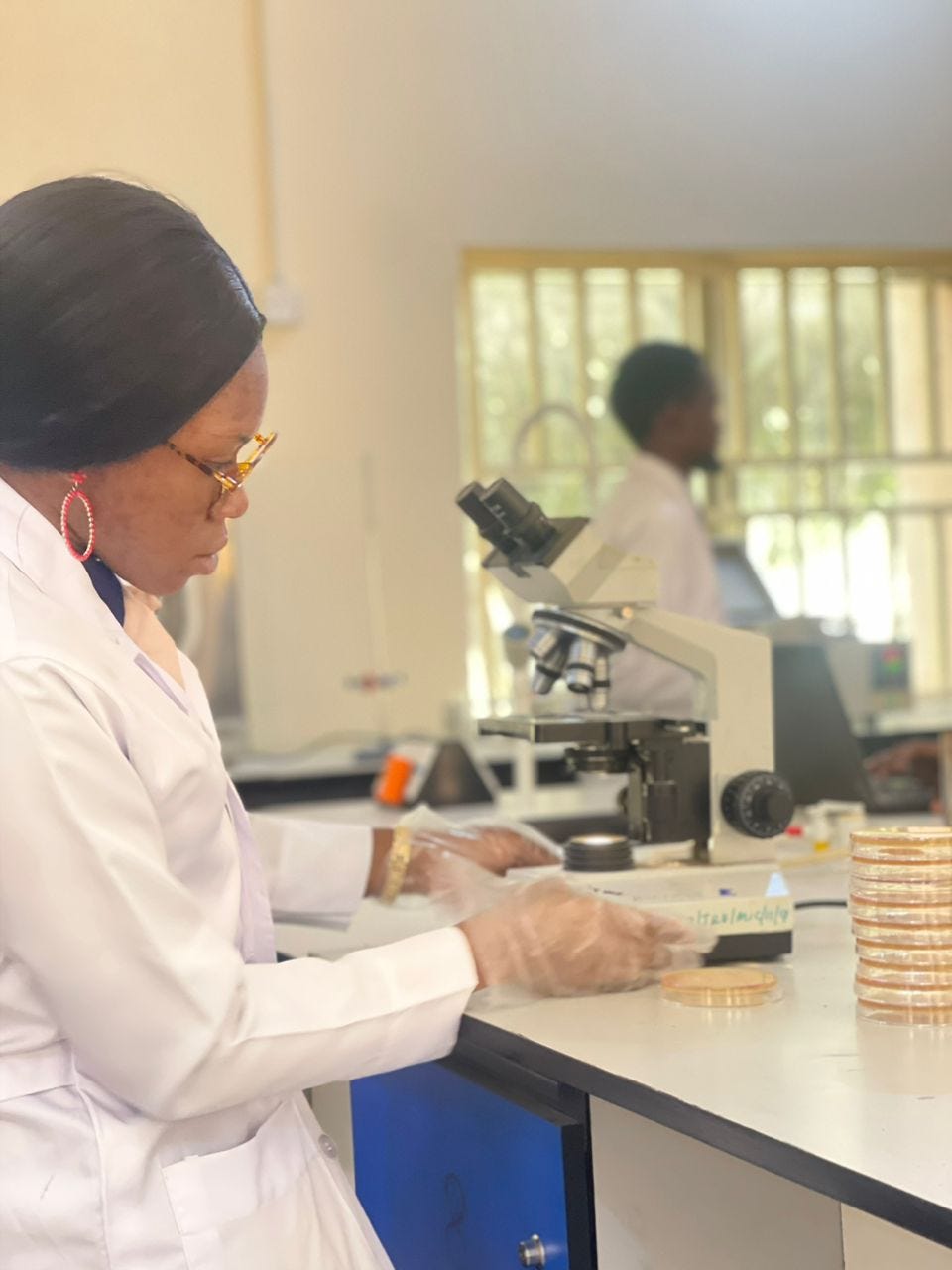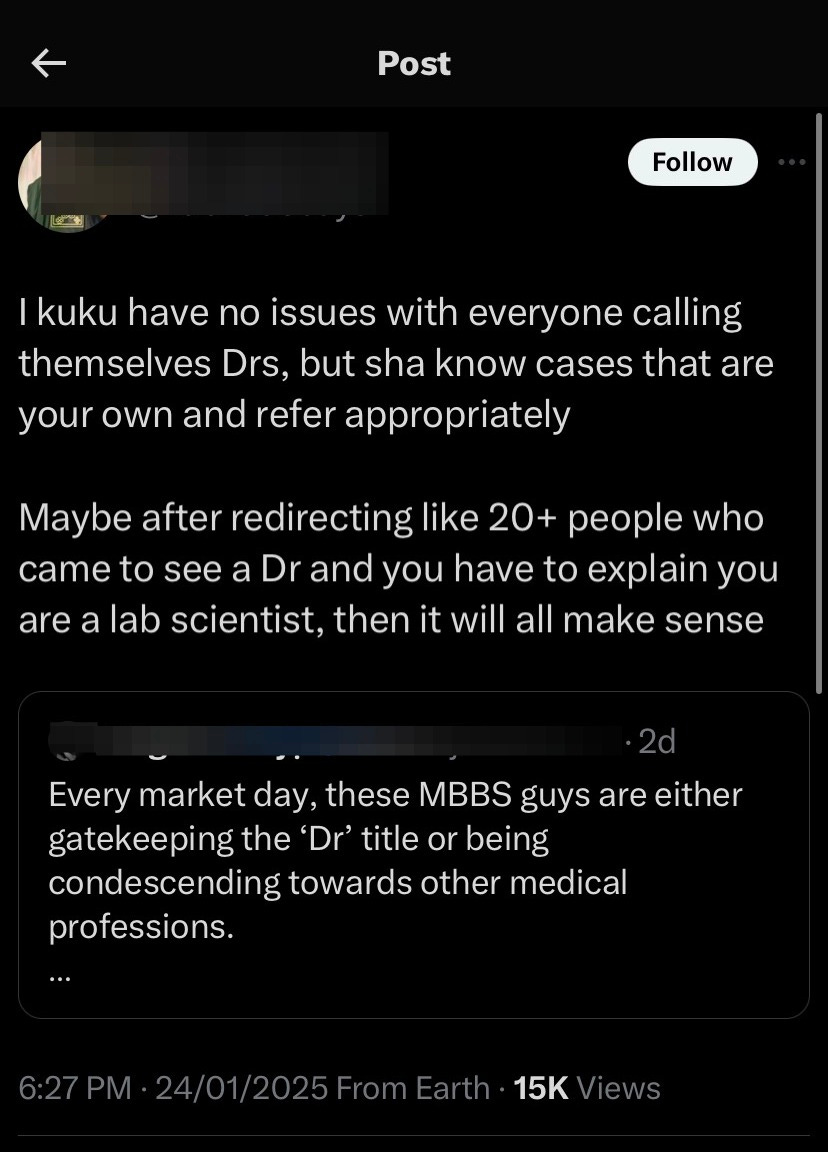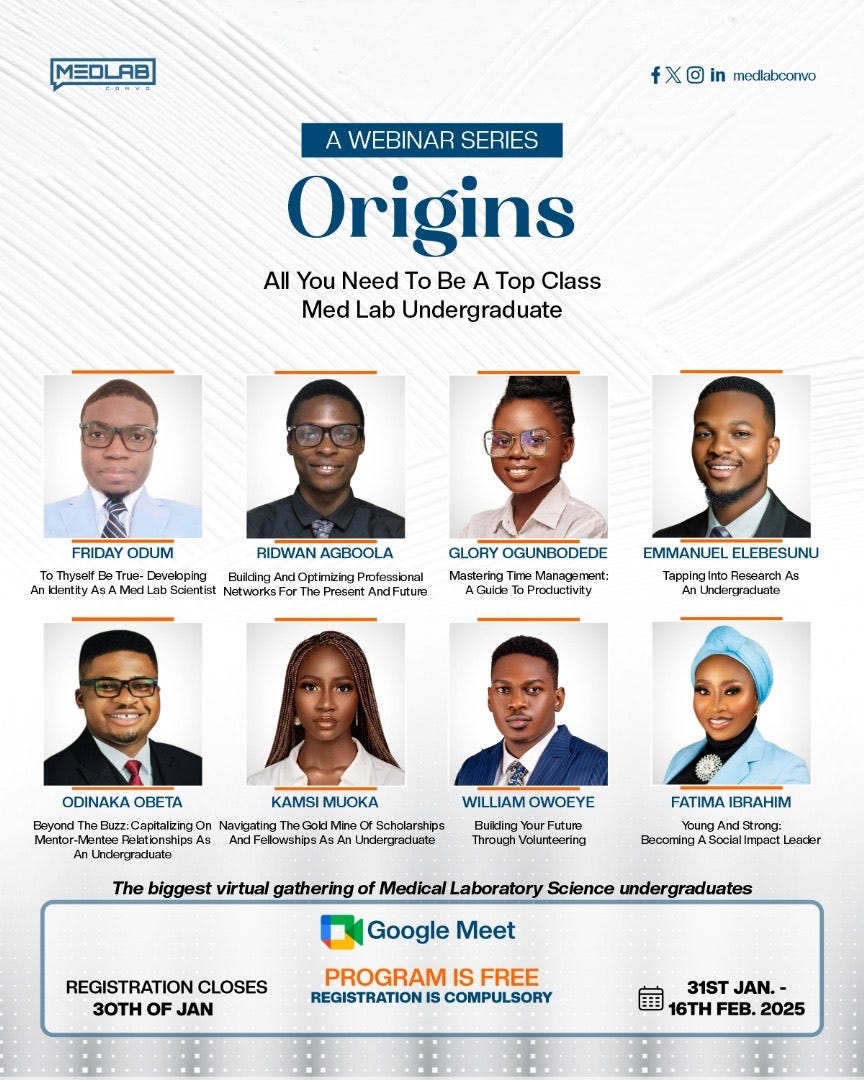AIM:
To discuss strategies for shaping a professional identity as a medical laboratory scientist.
Given:
Identity, Professional, Career, Mentorship, Continuous Learning, Origins.
Method:
Expository Essay
Principle:
Getting to a place of “belonging” is quite the journey, one that I have personal experiences with. As an undergraduate, I felt like a log in the sea swaying with the waves. I wasn't grounded and had no idea what I wanted to do with my degree. This changed when I became part of MedLabConvo and belonged. From belonging, I saw the diverse opportunities available to me and I began to form my identity.
Identity refers to the characteristics, values, and beliefs that define who a person is; the fact of being who or what a person or thing is. With every member of the society offered the liberty to identify as whatever they wanted to, the word identity has become sacred in our modern day society. This liberty however can pose the problem of having too many choices or the same society that had offered the liberty, snatches it away without care. Take Chidinma Adetshina, who faced public scrutiny over her dual South African and Nigerian identity during the 2024 Miss South Africa pageant. Her story highlights the challenges of reconciling identity in the face of external pressures. Similarly, young medical laboratory scientists often face challenges in defining their professional identity in a complex healthcare system.
Professional identity represents how an individual defines themselves within the context of their career, covering their values, skills, and professional beliefs. It reflects both an internal understanding of one’s role and how this role is perceived by others within and outside the field
.
Shaped by personal strengths, workplace culture, mentorship, and continuous learning, professional identity evolves over time. It goes beyond job titles, highlighting a deeper sense of belonging, ethical alignment, and dedication to growth within a chosen profession. At its core, professional identity is about answering the question: "What do I stand for as a professional?
Procedure:
WHO AM I AS A PROFESSIONAL?
Professional identity is defined primarily as the concept that describes how we perceive ourselves within occupational context and how we communicate this perception to others. This perception has been found generally not to be static but fluid - there are various factors that influence how professionals view themselves. Ranging from degree of self esteem to level of passion for the occupation in context.
Having a professional identity as a medical laboratory scientist is almost as important as sitting for professional exams for your licensure. We have established that generally professional identity is the internalized sense of being part of a profession, including its standards, ethics, and culture. For medical laboratory scientists, this identity is shaped by technical expertise, commitment to patient safety, and collaboration with other healthcare professionals. Studies suggest that a well-defined professional identity not only enhances job satisfaction but also improves overall performance and confidence in professional roles.
The Medical Laboratory Science profession is one that is underrepresented in the healthcare industry and have had to fight for the clout that it currently has. We have literally come from a place where training of laboratory professionals were regarded as mere assistants in exchange for evening lessons to where you have to undergo university education and a year internship before you can be licensed to practice.
The training of Medical Laboratory Technologists (the progenitors of Medical Laboratory Scientists) started during the colonial era. It started in the 1920s when the practitioners were regarded as mere errand boys, through semi-formal evening classes which led to intermediate and final diplomas of the Institute of Medical Laboratory Technology in the United Kingdom. It is worth noting that the development of the training and subsequent practice of Medical Laboratory Science in Nigeria has gone through an agonizing expedition in search of professional survival, recognition and excellence.
Besides this history, other contributory factors to the stunted growth of professional identity amongst medical laboratory scientists is limited visibility. Due to the nature of practice, medical laboratory scientists are not “perceived” at all in the background and this poses the challenge of forming an identity. In the same line of thought is the practically non existent inter-professional collaboration.
Just this past week, the conversation about Non MBBS health professionals addressing themselves as doctors resurfaced on the social media platform X, a reflection of the “better than you” culture we have here in Nigeria. This mindset limits the potential benefits of inter-professional interactions.
Put these together and it is easy to accept the obvious fate but this should not be one’s reality. One can develop a strong professional identity as a medical laboratory scientist and sustain it in the face of all the challenges that you might face.
HOW TO BECOME AND REMAIN WHO YOU ARE.
Carving Your Professional Identity
Developing a strong professional identity is a critical step for young medical laboratory scientists entering the field. Often, young persons struggle with low self esteem. This impacts other areas of their lives, professional identity included. The first step to shaping a professional identity then would be to deal with the root of the problem - low self esteem.
The internet is riddled with a thousand and one ways to improve your self esteem, believe in yourself more. A great place to begin however is recognizing and addressing low self-esteem as the foundation for building confidence in one's professional role. One can not also underestimate the power of positive affirmations. Take time to list out your achievements and strengths to reframe negative self-talk. In addition, engaging in physical activities like walking have been proven to be a confidence boost.
You must have heard however that “you cannot wish yourself into greatness”. There is no amount of positive affirmations that would get one to the peak of desired success.
One would therefore agree that in reality, building a professional identity is beyond self confidence. The following are some strategies that would be required in carving a professional identity as a medical laboratory scientist.
Excellent Work: The English Language Dictionary defines excellence as the quality of being outstanding or “extremely good”. To be extremely good as a medical laboratory scientist, here are some practical ways to strive for excellence: following the correct Standards of Operations (SOPs); ensuring that your practice produces quality results that your patients can trust and upgrading your knowledge of the practice to be in strides with current trends. There is the confidence that comes from knowing that you are excellent at what you do.\
At MedLabConvo, this is a culture that is encouraged in both volunteers and audience such as the attendees of The Origins 2025 beginning this week.
Engage in Networking: There is strength in numbers. Forming and becoming part of a professional network that reflects all the endless possibilities available helps boost a practitioner’s confidence. Networking involves building relationships with other professionals with similar, or diverse, interests that you can both learn from and teach. Maximize resources available on platforms such as Linkedin and X (formerly twitter) to harvest the benefits of networking.
It is also worthy of mention that mentorship plays a pivotal role in shaping professional identity. Role models within the profession can provide guidance, share experiences, and inspire young scientists to reach their full potential. In the same vein, associating with a community such as the UniVerse and Interntional communities for undergraduates and interns respectively as put together by MedLabConvo can be helpful. Similarly, attending conferences and programmes hosted by MedLabConvo and other professional bodies provides sufficient access to all the networks one might need on their journey to building and sustaining a strong professional identity
Embrace Lifelong Learning: Every year when we renew our license to practice, we pay a Continuous Professional Development (CPD) levy to the Medical Laboratory Science Council of Nigeria directed at encouraging all licensed practitioners to continually be in stride with relevant information about the profession. If the goal is to develop and sustain a formidable professional identity, continuous learning should be non-negotiable. CPD is important to us as medical laboratory scientists as it helps us give the best quality of care as we would stay current with skills and knowledge as well as ensure career advancement.
“No matter how much you've done or how successful you've been, there's always more to do, always more to learn and always more to achieve.”
Barack H. Obama
The confidence gained from staying up-to-date adds the finishing touch needed to enhance your professional identity. After all, we all know that academic validation often outweighs all other forms of external validation.
Building a professional identity as a young medical laboratory scientist is an evolving process that requires dedication, continuous learning, and active engagement with the profession. By embracing the values and culture of the field, advocating for their role in healthcare, and fostering collaboration with peers, young scientists can carve a distinct and respected identity. In doing so, they contribute not only to their own professional growth but also to the advancement of the medical laboratory profession as a whole.
This also is not a one-time task but a lifelong journey. Young medical laboratory scientists must remain adaptable and proactive, embracing changes and challenges as opportunities for growth. By doing so, they ensure their relevance and impact in the ever-evolving landscape of healthcare.
COMMENTS
Professional identities are important in practice of any profession and even more so as a medical laboratory scientist. Building one requires more than self-belief—it demands strategic, actionable steps. By prioritizing personal growth and professional excellence, every young medical laboratory scientist can carve a strong and respected identity that commands respect in the healthcare industry.
RECOMMENDATIONS
To find out who you are and begin to shape that person who you want to be is as easy as this read. Here are some of the recommended tips as highlighted by the article.
Start with Self-Acceptance; establishing a professional identity begins with personal development, particularly addressing self-esteem.
Pursue Excellence in Practice; excellence entails going beyond mediocrity by following correct Standards of Operations (SOPs), producing trustworthy results, and staying updated on industry trends.
Engage in strategic networking by building relationships with diverse professionals through platforms like LinkedIn and communities like MedLabConvo, and seek mentorship from role models to gain valuable guidance and career opportunities that strengthen your professional identity.
Commit to Lifelong Learning; continuous learning is non-negotiable for medical laboratory scientists aiming for professional growth. Staying current builds confidence and validates your expertise within the profession.
And with these strategies, young medical laboratory scientists can thrive, making impactful contributions to their profession and healthcare at large.











